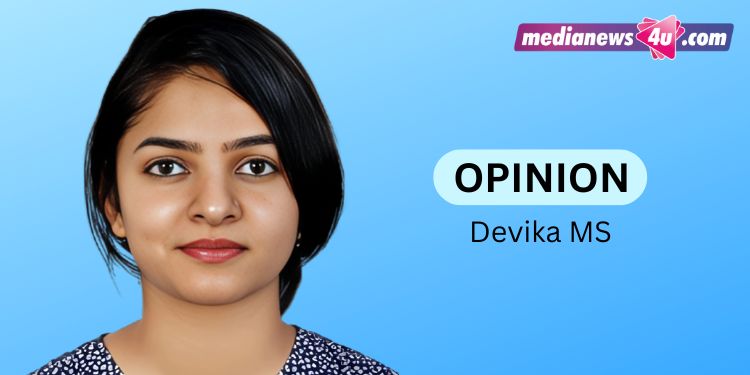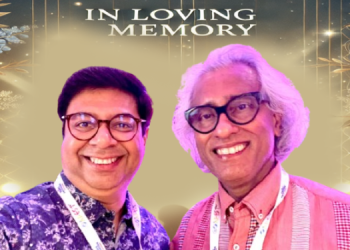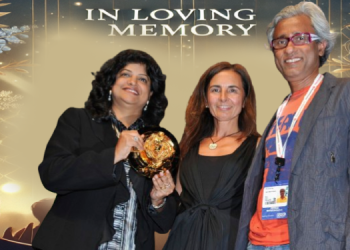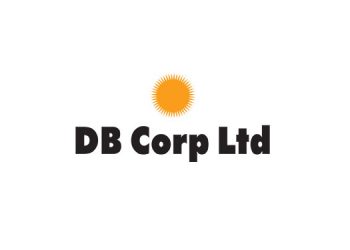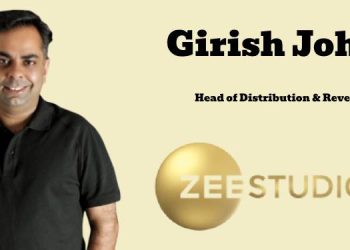On the impact of the General Elections 2024 on media…
General elections like festivals and events are a good opportunity for media companies to garner advertising revenues. Like earlier elections, the 2024 General Election will also see political parties and candidates advertising on all media platforms. Election time is the festival time for our democracy. Media is the vehicle through which the political parties, politicians, and candidates reach out to the electors. The Election Commission also spreads the message of exercising the right to franchise, ensuring voter engagement and turnout in polling booths. Mainstream media like newspapers and television extensively report on the happenings around the election and provide curated content to discerning readers and viewers so that they can make informed choices. It is through media intervention that the Election Commission ensures that the elections are free and fair, which is an essential feature of our democracy.
So, unlike festivals and events, elections cast heavy responsibility on the media to report objectively and in an unbiased manner while strictly following the Election Commission’s guidelines on advertising.
Democracy postulates that there should be periodic elections so that people may be able to either re-elect the same representatives or choose new ones. Democracy also contemplates that elections should be free and fair, and the voters should be able to vote for the candidates of their choice.
The prerequisite is that the elections are not rigged and manipulated, and the candidates or their agents cannot resort to unfair means and malpractices. The media is responsible for reporting such electoral misconduct and offences and enabling intervention by the Election Commission.
Winston Churchill described the importance of vote in a democratic election in the following words: “At the bottom of all tributes paid to democracy is the little man, walking into a little booth, with a little pencil, making a little cross on a little bit of paper – no amount of rhetoric or voluminous discussion can diminish the overwhelming importance of the point”.
Our Apex Court, quoting the words of Winston Churchill, said – “if we may add, the little, large Indian should not be hijacked from the course of free and fair elections by mob muscle methods, or subtle perversion of discretion by men “dressed in little, brief authority.” For “be you ever so high, the law is above you.”
This is the responsibility of the media, and the traditional media has been faithfully, diligently, and conscientiously discharging this responsibility since the first general elections in 1951.
2024 will be the eighteenth general election, and the traditional media, in keeping with its tradition, will be doing the same thing as it has been doing on the past 17 occasions and innumerable state assemblies, municipalities, and panchayat elections since independence.
With rapid technological developments, the internet has penetrated the democratic polity.
Political parties and candidates will engage Youtubers and social media influencers to produce content that will not come under the Model Code of Conduct. The Election Commission must seriously look at this, lest not only will there not be any level playing field for the mainstream media, but it will also affect elections’ free and fair conduct. Such content will be promoted and popularised through social networking sites and podcasts. Concerns have already been raised from various quarters about social media influencers doing interviews with Union Ministers in collaboration with My Gov, the government portal.
Political parties and aspiring candidates hire online influencers, even if it is not directly paid engagements. It is necessary to check such practices as they have no exposure to question or scrutinise the party spokesperson or candidates about the lofty claims. Influencer marketing must be included in the Model Code of Conduct by the Election Commission. It is akin to paid news in the mainstream media, which is frowned upon by the Election Commission and the Press Council. The nature of propaganda cannot become one-sided because it is digital. The Election Commission must amend the Model code of conduct to be in tune with the times. Genuine campaigns and advocacy over the internet must be made accountable, and the same must be treated on par with that of advertisements in the mainstream media, making pre-certification mandatory. Similarly, fake claims, false propaganda, etc., must be penalised.
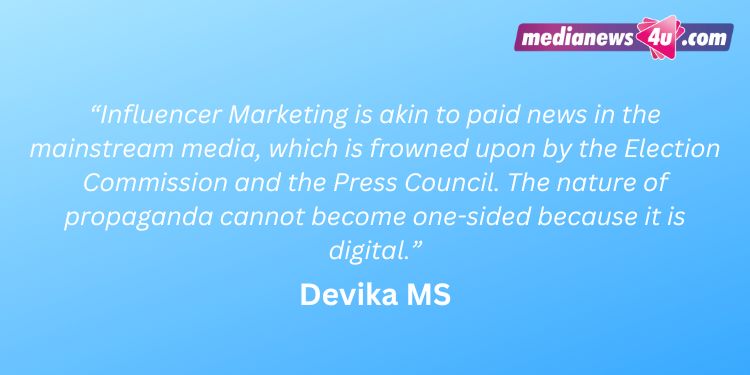
Social media also possesses very different characteristics from the mainstream media. Content created on social media enables candidates and political parties to micro-target content and ads. The social media intermediaries refraining from fact-checking statements creates an environment where false information can spread unchecked. As a result, falsehoods in micro-targeted political content will go unchecked—these falsehoods can significantly impact elections.
Regulation cannot be with a “one size fits all” approach. The Election Commission must regulate the ever-changing dynamics of communication over the Internet, considering the unique characteristics of the technology behind it.
Unlike traditional media, the internet and social media are pervasive and invasive as they can enter someone’s ears, catch the attention of someone’s eyes, and influence their minds and thoughts even if they have no part in accessing it or logging on to it.
On convergence of digital and traditional in 2024…
Integration of print, television and radio advertisements with the digital space will significantly impact democracy. Integration with digital will enable smaller, low-funded campaigns to reach potential constituents and voters. For this, the Election Commission must create an enabling environment. The present Model Code of Conduct needs to be revised to regulate digital solo. The Election Commission must bring out guidelines and a code of conduct to facilitate integration, which can increase voter engagement and turnout.
Leaving voters to make their own decisions about the veracity or otherwise of the content over social media will be apt for an ideal world, but not in a developing country like India, where falsehoods are easily pushed out to large and broad audiences and linger in the air without much public scrutiny. Hence, pre-certification of social media content must be made mandatory.
Traditional media like newspapers, television and radio provide curated content and are subject to stringent regulations. Editors of newspapers, magazines and television are responsible for selecting content. Television and radio are regulated by licensing regulations, program codes, advertising codes, uplinking and downlinking guidelines, the Cable TV Act, the Indian Penal Code, the law of torts and other regulations. Apart from common law, the newspapers are bound by the Press Council guidelines, wherein the Editor is responsible for content and advertisements. This brings in a lot of checks on the traditional media and, at the same time, enables them the required autonomy in its functioning. This makes traditional media more accountable.
Meanwhile, governments are grappling with how to control online media. This cannot be the case with the Election Commission of India. It is incumbent on the Election Commission to ensure proper checks and balances on the online medium, the internet and social media. Digital news publishers provide curated content. But, with the proliferation of social media influencers and the mushrooming of social media channels, there is absolutely no check on false news and propaganda. There are several fly-by-night operators in the digital space. Digital ad spend will be far less compared to the curated traditional media. This is because of a lack of accountability and no fact-checking system, making it less expensive than newspapers, television and radio.
The Election Commission must immediately curb this menace arising from technological changes by making it mandatory for social media intermediaries, influencers, online sites, and account holders to empanel or register with the Election Commission to provide political content and advertisements over the internet. Those who are not empanelled or registered with the ECI cannot upload political content and advertisements. Pre-certification rules applicable to newspapers must be made mandatory for digital.
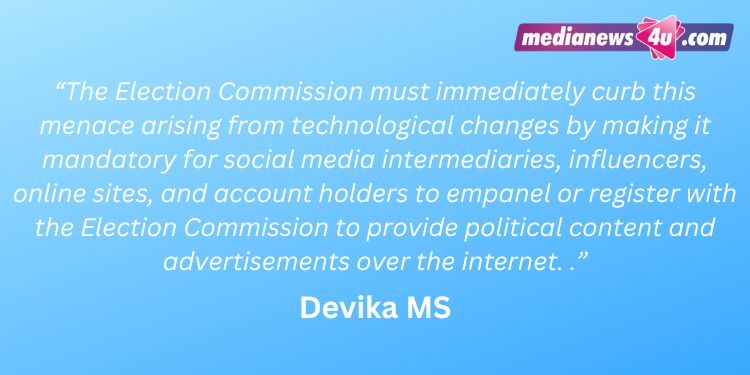
Whistleblower Christopher Wylie revealed that Donald Trump’s data analytics team, Cambridge Analytica, used personal information taken without authorisation to build a system that could profile individual U.S. voters to target them with personalised political advertisements.
Many social media influencers are under the scanner for violating income tax and GST laws. Recently, the Kerala High Court frowned upon unscrupulous Youtubers making biassed film reviews prejudicially affecting the film viewership, now notoriously called the “Review Bombing.”
Like newspapers, television and radio stations, there is no limit to how many social media platforms or users exist.
Unlike newspapers and television, social media platforms, users and online influencers are private persons who are not considered publishers. There is no control, liability or check on them for spreading false political content or campaigns. Even after the issuance of notices, taking down inaccurate content takes a lot of time; by the time the elections are over, the resultant damage must be done.
As already mentioned, micro-targeting is a distinctive characteristic of social media. And micro-targeting makes it very hard to distinguish real news and fake news. The Election Commission must immediately interfere with banning micro-targeted political ads, content, campaigns and promotions as it is easy to single out susceptible groups and direct political misinformation to them with little accountability because the public at large or the Election Commission or any law enforcing agency never sees the content.
Election Commission has stated that any political content in the form of messages, comments, photos, or videos posted or uploaded on the blogs or website will not be treated as a political advertisement and does not require pre-certification, even if the same is posted or uploaded by the political parties or candidates. This must be re-looked at to enable a level playing field for the traditional media and to enable integration.
Feedback: [email protected]

